Four Long-time Professors Say Farewell in Last Lecture
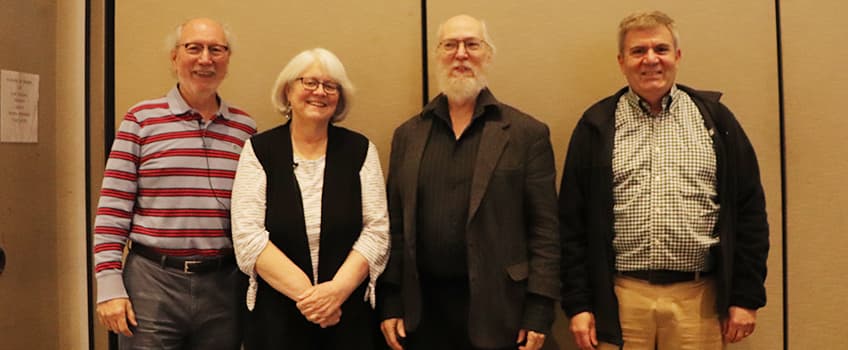
From left, Frank Cerreto, emeritus of Mathematics & First-Year Studies, Kate Ogden, professor of Art History, Rodger Jackson, professor of Philosophy and Tom Nolan Jr., professor of Physical Therapy are the featured professors who gave their last lecture as part of the Farewell Forum on April 9.
Galloway, N.J. — “Every year it just gets better,” said Patricia Thatcher, dean of the Library as she highlighted this year’s group of four Stockton University retiring faculty on April 9.
The faculty members had an opportunity to present their final lecture to an audience full of supportive colleagues as part of the renamed Farewell Forum. The event was previously known as Last Lecture.
All four professors will leave meaningful legacies at Stockton, which shone through in their presentations. The faculty members who spoke in the Board of Trustees in the Campus Center were:
- Frank Cerreto, emeritus of Mathematics & First-Year Studies
- Kate Ogden, professor of Art History
- Rodger Jackson, professor of Philosophy
- Tom Nolan Jr., professor of Physical Therapy
Frank Cerreto: ‘Farewell Stockton: A Transition Project’
Cerreto kicked things off with a reflection on his 49-year career at Stockton.
“What do I say after 49 years?” he said.
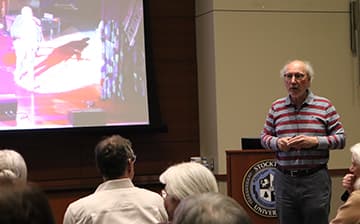
He debated several topics, from “lessons learned from students and colleagues” to the importance of higher education.
“What I really want to talk about is the Stockton Faculty Band,” he said.
From there, Cerreto went on to describe the work the band has done since its inception in the 1980s. The band consists of seven current members, 10 past members, and six session players.
Cerreto described his journey as he “created a big mess,” collecting several thousand items to create a 79-page book containing everything there is to know about the band. The book was put together with the help of Professor of Art Michael McGarvey, who was able to take the research Cerreto had conducted and turn it into a book, which they hope will soon be available to the public.
“The (Stockton Faculty) Band is a distinctive phenomenon,” Cerreto said. The band has played at events such as new student orientations and “we even played a wedding.” The band has worked together to raise money for student scholarships, raising a total of over $60,000.
“(We) have a great time and do some good.… It can’t get better than that.… We embody the Stockton Spirit.”
Kate Ogden: ‘How Can a Banana be Art?’
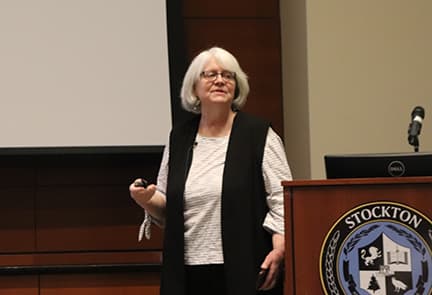
Ogden recapped her time at Stockton and chose to discuss how seemingly anything, even a banana, can be considered art. The work in question comes from Mauricio Catalan, who initially sold the piece consisting of a banana duct taped onto a wall for $120,000.
“Art is always about art,” Ogden said. “The banana is supposed to be a banana.”
She went on to explain how anything can be art if it is in an art context.
“Artists are always responding to artists before them…sometimes there’s no originality at all, except it was (their)] idea,” said Ogden, going on to show the works that came about from this piece, such as when American artist David Datuna ate the $120,000 banana.
Rodger Jackson: ‘Reflections’
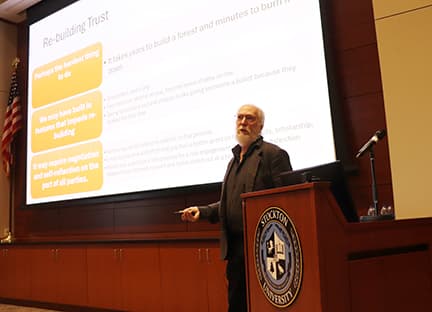
Jackson, professor of Philosophy, gave his final lecture titled “Reflections” after 27 years at the university. He emphasized the importance of trust and how it is key to power.
“(Without trust) you can live, but you can’t thrive,” he said.
Trust is a complex matter, and it is a subject which can easily be breached and not as easily mended.
“It takes years to build a forest and minutes to burn it down,” Jackson said.
This brought Jackson to the question of “Why bother?” Why bother having trust within the structure of the university? Well, Dr. Jackson believes “our university is worth that risk.”
Tom Nolan Jr.: ‘The Body is Electric’
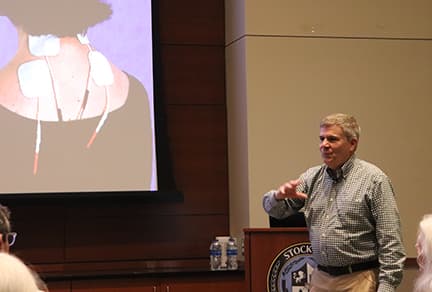
Nolan Jr., professor of Physical Therapy, has been teaching electrotherapy for 36 years. He described how “the nervous system is an electrical circuit. … It sends thousands of electrical messages.” Those are responsible for bodily functions, he explained.
“Electrotherapy is effective in the healing of skin,” he said. He went on to describe how, if found early enough, swelling of sprains and strains can be prevented with electrotherapy.
He described various other methods of electric healing, such as iontophoresis, the transdermal delivery of medications and its neurological uses for restoring function after events like a stroke.
“There’s lots of possibilities, we’ve really just scratched the surface of what’s possible,” he said.
— Story and photos by Zuleika Rodriguez Garcia of the Osprey Social Team


